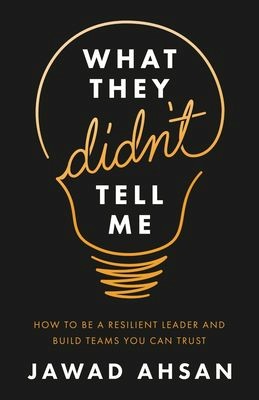By Christopher Durso, Vice President of Content Development, Hospitality Sales & Marketing Association International (HSMAI)
Inspired by the high-level, cross-disciplinary conversation of HSMAI’s Curate event, the Curate Book Club (previously known as the Innovation Book Club) interviews the authors of new and recent books that are relevant to hospitality sales, marketing, and revenue optimization leaders. Read previous Curate Book Club interviews here.
 “Be a leader this week.” Jawad Ahsan received that advice from a mentor early in his career, and it stayed with him — so much so that it’s the title of one of the chapters in his new book, What They Didn’t Tell Me: How to Be a Resilient Leader and Build Teams You Can Trust.
“Be a leader this week.” Jawad Ahsan received that advice from a mentor early in his career, and it stayed with him — so much so that it’s the title of one of the chapters in his new book, What They Didn’t Tell Me: How to Be a Resilient Leader and Build Teams You Can Trust.
But at first, he didn’t know what to make of it. “I didn’t really know how to process it or what it meant, and he said it again,” Ahsan said in an interview. “What I’ve come to realize since then is that being a leader is a choice. You don’t just get to a place where you have a title or a certain level of authority and you’re automatically a leader. What makes you a leader is that you consciously choose to be a leader and to exhibit certain behaviors and to drive alignment and to care about other people and care about their development. There’s a lot that goes into it, and you don’t just get a series of promotions and all of a sudden you’re a leader.”
What They Didn’t Tell Me draws on leadership lessons Ahsan has learned throughout his career — first working in various roles at GE, including CFO of GE Healthcare’s electronic health record and enterprise software businesses, then moving to CFO of Market Track, an SaaS marketing intelligence company. Today, he serves as CFO of Axon, a public-safety technology company. Recently he talked to HSMAI about practicing resilient leadership, finding your North Star, and understanding the four uncoachable traits.
Right in the subtitle, you foreground the idea of being a resilient leader. What does that mean?
One of the things that I’ve learned over the course of my career — and it’s become even more pronounced the bigger the job and the higher up I’ve gotten — is that a lot of people, when they get to the ranks of leadership or become executives, they’ve gotten there because they’re talented, they’re good at what they do, and they’ve earned their way there. When they’re unable to stay there or they’re unable to progress any further, more often than not it’s because they self-sabotage somehow. They pick the wrong battles, or they find slights and things that maybe they shouldn’t get upset over, or maybe they’re just unable to deal with the pressure. So much of it just comes down to their own inability to be resilient in certain situations.
Over the course of my career, I would get this feedback that was tough for me to hear in some cases, and I stopped being emotional about it and realized, you know what? There’s some kernel of truth in what this person is telling me. Let me reflect on it and really find a way to improve myself. It got to such a degree where I view feedback as a gift, and I ask people all the time, “Tell me how you felt.” When people will just say, “Oh, you did a great job,” I usually dig for more. What I want to hear is the critique, because for me, the critique is where you grow. What I realized without really describing it was, I’d found a way to be resilient by not getting worked up over these things that get other people worked up.
Has the pandemic changed how you think about the idea of resilience?
It has. My definition now for resilience would not only be the first part we described — for you to individually be resilient and to roll with the punches and to be a little bit more introspective — but now I would add to that, in this pandemic type of environment, you also have to find a way to stay visible. The old adage is unfortunately true: out of sight, out of mind. You’ve got to work even harder when you’re not in an office to find a way to stay visible.
You said that you have to consciously choose to be a leader. By extension, can you, should you consciously choose to be a resilient leader?
I think the two go hand in hand. One of the biggest surprises for me when I got to an executive role was, I knew that the span of my organization had expanded beyond just being an individual contributor, but what I really had to become mindful of is that people are looking to you. Not just for guidance and for you to tell them what to do or give them objectives or drive alignment, but they’re looking at your body language. They’re looking at how do you react in situations of adversity and if there’s any bad news. People take their cues from you, so it’s very important that when you’re a leader, you’re a resilient leader, because your organization is looking to you. That’s going to help set the tone for your team.
In the book you talk about the idea of defining your North Star. Can you talk about what that is and how it came to you?
It really came to me about eight or nine years into my career at GE. I was just keeping my head down and working really hard and waiting for someone to tap me on the shoulder for my next gig. That happened in one instance. I got a call from an old manager of mine who said I want you to come over to this division of GE I’d never worked in before. I went and took this job, and a month later he went somewhere else. Now I was in this part of GE where I had no network or connections or anything like that and felt like I was at a bit of a dead end. I realized if I kept doing that — if that was my model for my career — I would end up where other people wanted me to be, not where I wanted to be.
So I sat back and thought about what is it that I’m passionate about. I was really passionate about being an operator, running a business. That’s what I said is my North Star. The proxy for that was being a CEO, but really, the North Star was to run a business. The thing that changed for me was, once I defined my North Star, I really started focusing on the experiences that I needed to get there and I started actually turning down jobs. Things would come my way that I probably would have taken in the past because it was maybe a little bit more pay, it was a bigger title, it was a little bit of a bigger job, but it wasn’t getting me a new experience that I needed to get to where I wanted to go.
That’s one thing that’s shifted in me, and now where I am in my career, it also helps me identify talent in a certain way, because I now look at — if someone’s got 20 years of experience, did they do the same thing one year at a time for 20 different times, or did they really seek different experiences as they grew in their career?
Is resilient leadership something that you can not just build into your own leadership style but cultivate throughout your team?
I think you can. I actively try to do it every day. I talk in the book about these four traits that I consider to be uncoachable: strong sense of integrity, accountability, a sense of collaboration, and positivity. Those four traits I have tried to coach into people, and what I’ve found is that I’ll waste my time, because they really speak to someone’s character. If someone doesn’t have those traits, I know they’re not a right fit for my organization.
Those four traits collectively are important, because they’re really a heuristic or a shortcut for trust. If you’ve got those traits, I know I can trust you. You also know that you can trust that your peers have them. You can trust each other. Once everyone trusts each other, you can just move that much faster, and that’s also where the resiliency comes in. You do become more resilient, because when you’re faced with adversity, if you trust each other, that goes a long way toward the team being resilient.
The hospitality industry has been deeply affected by the pandemic, including widespread layoffs and furloughs. How should hospitality leaders be approaching leadership in this type of crisis environment?
The thing I would say is that this is a temporary thing, and the world is going to return to some type of normalcy going forward. Maybe we’re not going to be going into the office as much as we were, but I do think hospitality is going to bounce back. What you could ask for yourself is, if you’ve been in the industry for a long time and you have built a brand for yourself and you’ve been on this trajectory, then don’t blink because there’s this short-term impact right now. All of those things that you’ve built over a number of years, you don’t want to give them up because there’s some short-term pain right now, right?
The other thing I would say is, this might be a good opportunity for you to really, really evaluate what is your North Star and where are you headed. If the hospitality industry or any industry you’re in can help you get there and give you the opportunities to help you achieve what you want to achieve, then great. You should stay that course. But if not, then maybe this is a catalyst for change.
